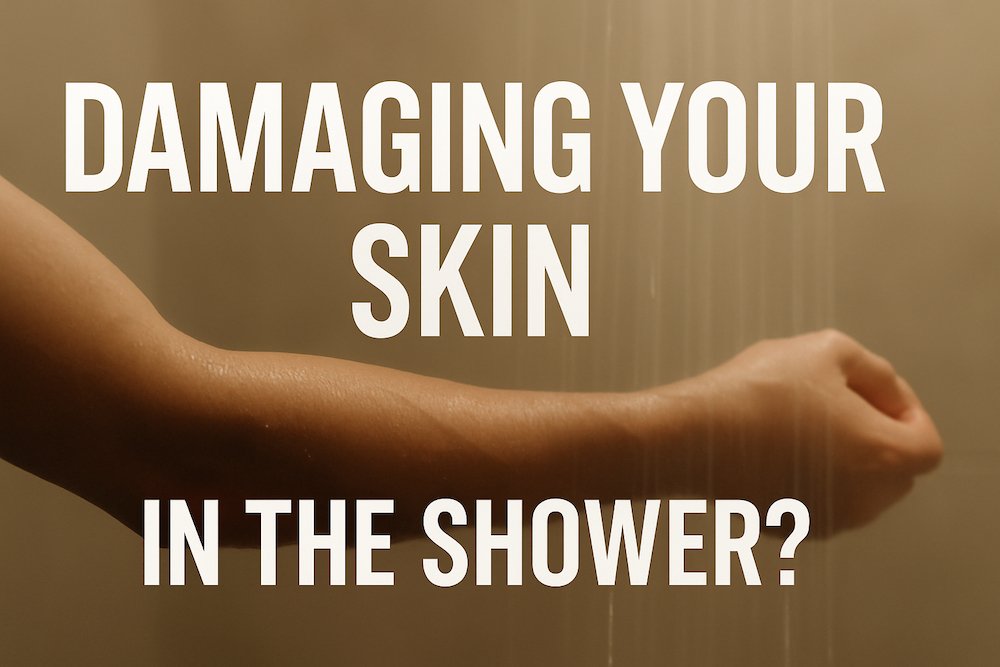Introduction: A Daily Habit with Hidden Consequences
Most of us start our day with a warm, comforting shower. But what if that simple habit is silently harming your skin? According to dermatologists and scientific sources like the Mayo Clinic, certain shower practices — especially involving hot water — can compromise your skin’s health. In this article, we break down how your shower could be damaging your skin, what science says about it, and how to fix it.
1. The Skin Barrier: Your First Line of Defense
Your skin’s outermost layer is called the stratum corneum — a complex structure of cells and lipids that acts as a protective barrier. It keeps moisture in and harmful substances out. When this barrier is disrupted, it leads to dryness, irritation, sensitivity, and even long-term skin conditions.
2. The Problem with Hot Showers
Hot water feels relaxing, but it’s a major culprit when it comes to damaging the skin barrier. Here’s how:
- Strips Natural Oils: Hot water dissolves the natural sebum (oil) that protects your skin, leaving it dry and exposed.
- Inflammation: The heat can increase blood circulation in the skin, causing redness and inflammation.
- Weakens Barrier Function: Prolonged hot showers break down proteins and lipids in the skin, making it more permeable and less resilient.
3. Signs Your Shower Might Be Hurting Your Skin
- Tightness or dryness after showering
- Redness or itching, especially on the arms and legs
- Flaky patches or increased sensitivity
- Acne or breakouts from over-cleansing
4. Science-Backed Recommendations
The Mayo Clinic and dermatologists recommend these adjustments:
- Shorter Showers: Limit to 5–10 minutes
- Use Lukewarm Water: Not cold, not hot — just comfortably warm
- Gentle Cleansers: Avoid harsh soaps or body washes with sulfates
- Pat Dry, Don’t Rub: Use a towel to gently blot your skin
- Moisturize Immediately: Apply a moisturizer within 2–3 minutes after drying off
5. Recommended Shower Habits
To build a skin-friendly routine:
- Shower once per day or every other day, unless you’ve been sweating heavily
- Avoid using loofahs or abrasive tools daily
- Focus soap on sweat zones (armpits, groin, feet) and rinse other areas with water only
6. Skin Types and Showering
- Dry Skin: More sensitive to heat; needs rich moisturizers and short showers
- Oily Skin: Can handle slightly longer showers but still benefits from lukewarm water
- Sensitive Skin: Should avoid all scented and harsh cleansers entirely
7. How Weather Affects Shower Impact
In cold climates or during winter, skin loses more moisture. Hot showers during these times can cause even more harm. Humid environments provide more protection, but heat should still be minimized.
8. The Role of Shower Water Quality
Hard water (rich in calcium and magnesium) can worsen skin dryness and irritate sensitive skin. Chlorine from treated water may also strip away natural oils.
9. Tools That Protect Your Skin in the Shower
Here are dermatologist-approved tools that can make your shower routine safer and healthier:
- AquaHomeGroup Shower Head Filter for Hard Water – 20-Stage
Reduces chlorine, heavy metals, and impurities. Designed to improve skin and hair health by softening the water.
Buy on Amazon - CeraVe Hydrating Foaming Oil Cleanser
A moisturizing oil cleanser for face and body that maintains the skin’s natural barrier with ceramides and hyaluronic acid.
Buy on Amazon - CeraVe Moisturizing Cream for Dry Skin
A dermatologist-recommended body and face cream that locks in moisture and supports the skin barrier. Great for use after every shower.
Buy on Amazon - MX08 Wireless Shower Temperature Monitor
A compact, easy-to-install device that displays water temperature in real time, helping you avoid hot showers that can damage your skin.
Buy on Amazon
10. Long-Term Benefits of Changing Your Routine
Making these small adjustments can:
- Reduce skin dryness and flakiness
- Improve texture and softness
- Help manage conditions like eczema and keratosis pilaris
- Support long-term skin barrier health
Conclusion: A Better Shower = Better Skin
Your daily shower isn’t just a cleansing routine — it’s a moment that can either support or sabotage your skin’s health. With just a few tweaks, supported by science, you can protect your skin, reduce damage, and maintain a healthy, glowing barrier every day.
Your skin is your largest organ. It deserves smarter care — even in the shower.
👉 Want to see the science in action?
Find out how your daily shower might be secretly damaging your skin — and what to do about it.
🎥 Watch the Short on YouTube
If that fascinated you, check this out next…Why You Should Install a Shower Filter — Science-Backed Benefits for Skin, Hair, and Health
